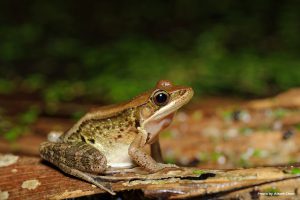In frogs, ability to tolerate pesticide exposure comes with trade-offs
 Photo credit: Albert-Chen
Photo credit: Albert-Chen
Amphibians, such as frogs, are particularly susceptible to the effects of pollution in their environment. While it is well established that pest species (insects that eat crops or weeds) can develop resistance to pesticides, more recent evidence has shown that native plants and animals can also develop tolerance them. When native organisms develop a tolerance to agricultural pesticides, it means that they are less likely to be harmed from exposure than individuals that have no tolerance. However, new research demonstrates that the ability to endure pesticide exposure may be accompanied by other health trade-offs. A recent study published in the Journal Evolutionary Applications has found that wood frog populations that have evolved tolerance to pesticides over multiple generations due to continuous exposure may also be more susceptible to ranavirus--a virus that has devastated amphibian, reptile and fish populations around the world. The study identified 15 wood frog populations ranging in proximity to agriculture. Using individuals collected from these populations, researchers conducted laboratory experiments testing responses to the insecticide carbaryl while simultaneously exposing them to trematode parasites and ranavirus. They found that frogs that lived close to agriculture and had evolved tolerance to the pesticide over multiple generations had higher viral loads than frogs living further away from agriculture, and the opposite was true for the trematode parasite. “Collectively, our results demonstrate that evolved pesticide tolerance can indirectly influence host–parasite interactions and underscore the importance of including evolutionary processes in eco-toxicological studies,” the authors conclude.



